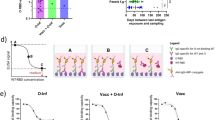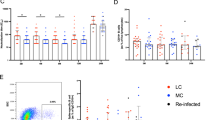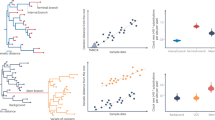Abstract
The malaria parasite Plasmodium falciparum has evolved to prolong its duration of infection by antigenic variation of a major immune target on the surface of the infected red blood cell. This immune evasion strategy depends on the sequential, rather than simultaneous, appearance of immunologically distinct variants. Although the molecular mechanisms by which a single organism switches between variants are known in part1,2,3, it remains unclear how an entire population of parasites within the host can synchronize expression to avoid rapidly exhausting the variant repertoire. Here we show that short-lived, partially cross-reactive immune responses to parasite-infected erythrocyte surface antigens can produce a cascade of sequentially dominant antigenic variants, each of which is the most immunologically distinct from its preceding types. This model reconciles several previously unexplained and apparently conflicting epidemiological observations by demonstrating that individuals with stronger cross-reactive immune responses can, paradoxically, be more likely to sustain chronic infections. Antigenic variation has always been seen as an adaptation of the parasite to evade host defence: we show that the coordination necessary for the success of this strategy might be provided by the host.
This is a preview of subscription content, access via your institution
Access options
Subscribe to this journal
Receive 51 print issues and online access
$199.00 per year
only $3.90 per issue
Buy this article
- Purchase on Springer Link
- Instant access to full article PDF
Prices may be subject to local taxes which are calculated during checkout




Similar content being viewed by others
References
Newbold, C. Antigenic variation in Plasmodium falciparum: mechanisms and consequences. Curr. Opin. Microbiol. 2, 420–425 (1999)
Scherf, A. et al. Antigenic variation in malaria: in situ switching, relaxed and mutually exclusive transcription of var genes during intra-erythrocytic development in Plasmodium falciparum. EMBO J. 17, 5418–5426 (1998)
Deitsch, K. W., Calderwood, M. S. & Wellems, T. E. Malaria. Cooperative silencing elements in var genes. Nature 412, 875–876 (2001)
Bull, P. C. et al. Parasite antigens on the infected red cell surface are targets for naturally acquired immunity to malaria. Nature Med. 4, 358–360 (1998)
Giha, H. A. et al. Antibodies to variable Plasmodium falciparum-infected erythrocytes surface antigens are associated with protection from novel malaria infections. Immunol. Lett. 71, 117–126 (2000)
Dodoo, D. et al. Antibodies to variant antigens on the surfaces of infected erythrocytes are associated with protection from malaria in Ghanian children. Infect. Immun. 69, 3713–3718 (2001)
Tebo, A. E., Kremsner, P. G., Piper, K. P. & Luty, A. J. Low antibody responses to variant surface antigens of Plasmodium falciparum are associated with severe malaria and increased susceptibility to malaria attacks in Gabonese children. Am. J. Trop. Med. Hyg. 67, 597–603 (2002)
Marsh, K. & Howard, R. Antigens induced on erythrocytes by P. falciparum: expression of diverse and conserved determinants. Science 231, 150–153 (1986)
Gupta, S., Trenholme, K., Anderson, R. M. & Day, K. P. Antigenic diversity and the transmission dynamics of Plasmodium falciparum. Science 263, 961–963 (1994)
Bull, P. C., Lowe, B. S., Kortok, M. & Marsh, K. Antibody recognition of Plasmodium falciparum erythrocyte surface antigens in Kenya: evidence for rare and prevalent variants. Infect. Immun. 67, 733–739 (1999)
Ofori, M. F. et al. Malaria-induced acquisition of antibodies to Plasmodium falciparum variant surface antigens. Infect. Immun. 70, 2982–2988 (2002)
Giha, H. A. et al. Nine-year longitudinal study of antibodies to variant antigens on the surface of Plasmodium falciparum-infected erythrocytes. Infect. Immun. 67, 4092–4098 (1999)
Kinyanjui, S., Bull, P. C., Newbold, C. I. & Marsh, K. Kinetics of antibody responses to Plasmodium falciparum-infected erythrocyte variant surface antigens. J. Infect. Dis. 187, 667–674 (2003)
Bull, P. C. et al. Plasmodium falciparum infections are associated with agglutinating antibodies to parasite-infected erythrocyte surface antigens among healthy Kenyan children. J. Infect. Dis. 185, 1688–1691 (2002)
Kosinski, R. J. Antigenic variation in trypanosomes: a computer analysis of variant order. Parasitology 80, 343–357 (1980)
Agur, Z., Abiri, D. & Van der Ploeg, L. H. T. Ordered appearance of antigenic variants of African trypanosomes explained in a mathematical model based on a stochastic switch process and immune-selection against putative switch intermediates. Proc. Natl Acad. Sci. USA 86, 9626–9630 (1989)
Frank, S. A. A model for the sequential dominance of antigenic variants in African trypanosome infections. Proc. R. Soc. Lond. B 266, 1397–1401 (1999)
Antia, R., Nowak, M. A. & Anderson, R. M. Antigenic variation and the within-host dynamics of parasites. Proc. Natl Acad. Sci. USA 93, 985–989 (1996)
Nowak, M. A. et al. Antigenic oscillations and shifting immunodominance in HIV-1 infections. Nature 375, 606–611 (1995)
Haraguchi, Y. & Sasaki, A. Evolutionary pattern of intra-host pathogen antigenic drift: effect of cross-reactivity in immune response. Phil. Trans. R. Soc. Lond. B 352, 11–20 (1997)
Gog, J. R. & Grenfell, B. Dynamics and selection of many-strain pathogens. Proc. Natl Acad. Sci. USA 99, 17209–17214 (2002)
Molineaux, L. et al. Plasmodium falciparum parasitaemia described by a new mathematical model. Parasitology 122, 379–391 (2001)
Paget-McNichol, S., Gatton, M., Hastings, I. & Saul, A. The Plasmodium falciparum var gene switching rate, switching mechanism and patterns of parasite recrudenscence described by mathematical modelling. Parasitology 124, 225–235 (2002)
Gupta, S. et al. The maintenance of strain structure in populations of recombining infectious agents. Nature Med. 2, 437–442
Chattopadhyay, R. et al. Plasmodium falciparum infection elicits both variant-specific and cross-reactive antibodies against variant surface antigens. Infect. Immun. 71, 597–604 (2003)
Gamain, B., Miller, L. H. & Baruch, D. I. The surface variant antigens of Plasmodium falciparum contain cross-reactive epitopes. Proc. Natl Acad. Sci. USA 98, 2664–2669 (2001)
Molineaux, L. & Gramiccia, G. The Garki Project (World Health Organisation, Geneva, 1980)
Beck, H.-P. et al. Analysis of multiple Plasmodium falciparum infections in Tanzanian children during the trial of the malaria vaccine SPf66. J. Infect. Dis. 175, 921–926 (1997)
Acknowledgements
We thank A. McLean, G. Rudenko and D. Barry for their valuable comments, and the MRC and The Wellcome Trust for financial support.
Author information
Authors and Affiliations
Corresponding author
Ethics declarations
Competing interests
The authors declare that they have no competing financial interests.
Supplementary information
Supplementary Figure 1
The effect of explicitly incorporating clonal expansion of immune cells.
Supplementary Figure 1 Legend
Containing details of modified equations.
Rights and permissions
About this article
Cite this article
Recker, M., Nee, S., Bull, P. et al. Transient cross-reactive immune responses can orchestrate antigenic variation in malaria. Nature 429, 555–558 (2004). https://doi.org/10.1038/nature02486
Received:
Accepted:
Issue Date:
DOI: https://doi.org/10.1038/nature02486
This article is cited by
-
Competitive dual-strain SIS epidemiological models with awareness programs in heterogeneous networks: two modeling approaches
Journal of Mathematical Biology (2023)
-
Mechanistic within-host models of the asexual Plasmodium falciparum infection: a review and analytical assessment
Malaria Journal (2021)
-
Modelling intra-host competition between malaria parasites strains
Computational and Applied Mathematics (2020)
-
Models of immune selection for multi-locus antigenic diversity of pathogens
Nature Reviews Immunology (2019)
-
Plasmodium vivax and Plasmodium falciparum infection dynamics: re-infections, recrudescences and relapses
Malaria Journal (2018)
Comments
By submitting a comment you agree to abide by our Terms and Community Guidelines. If you find something abusive or that does not comply with our terms or guidelines please flag it as inappropriate.



